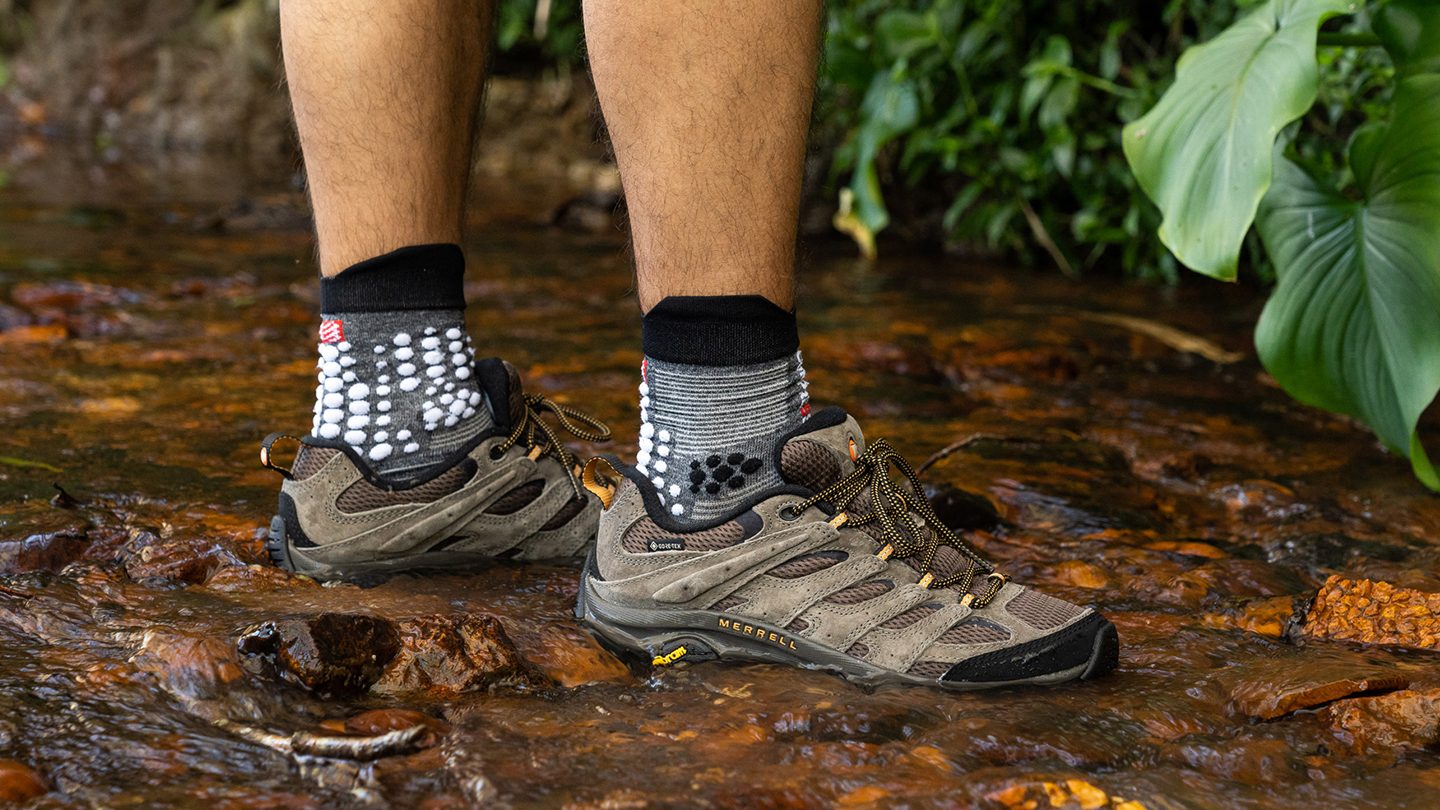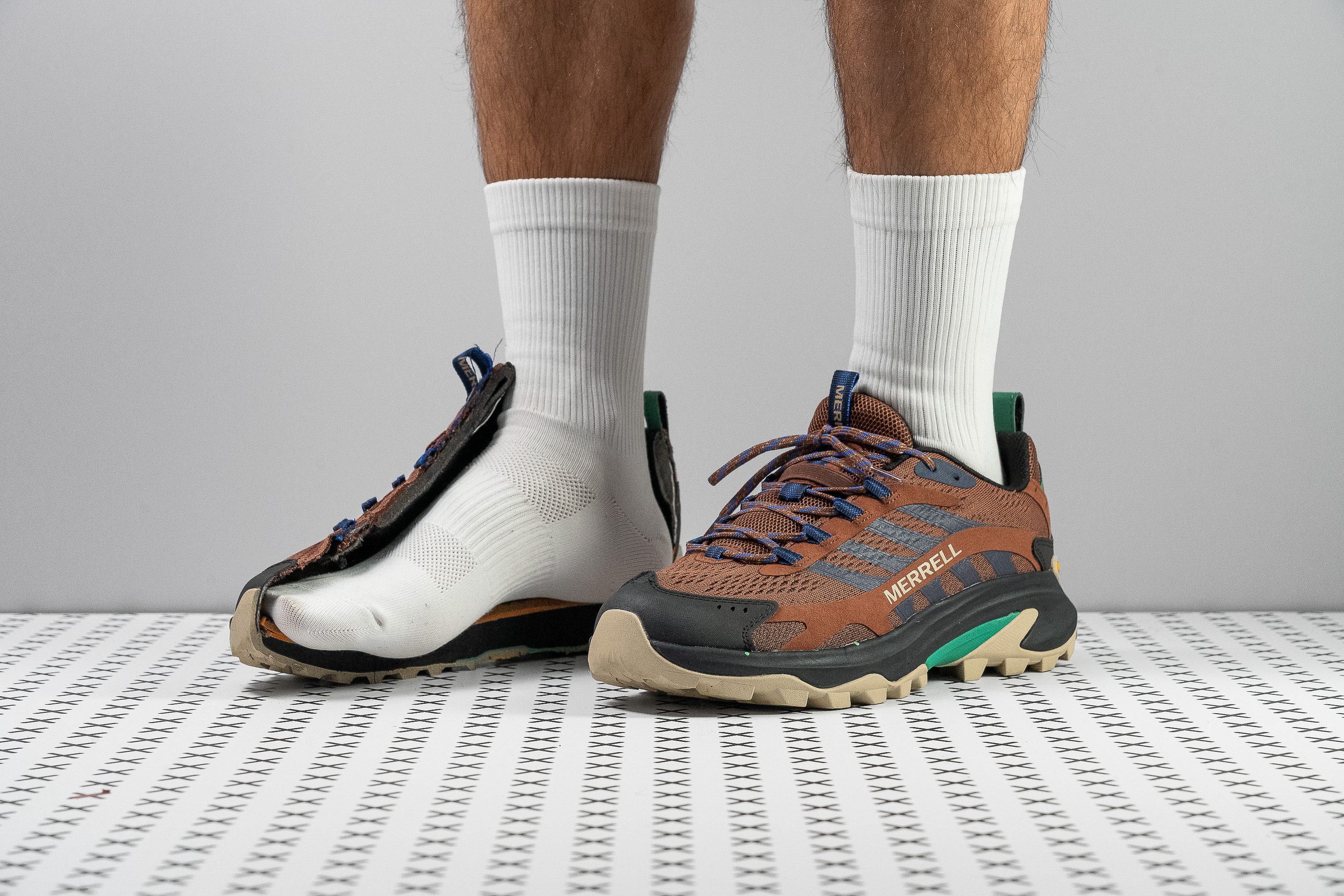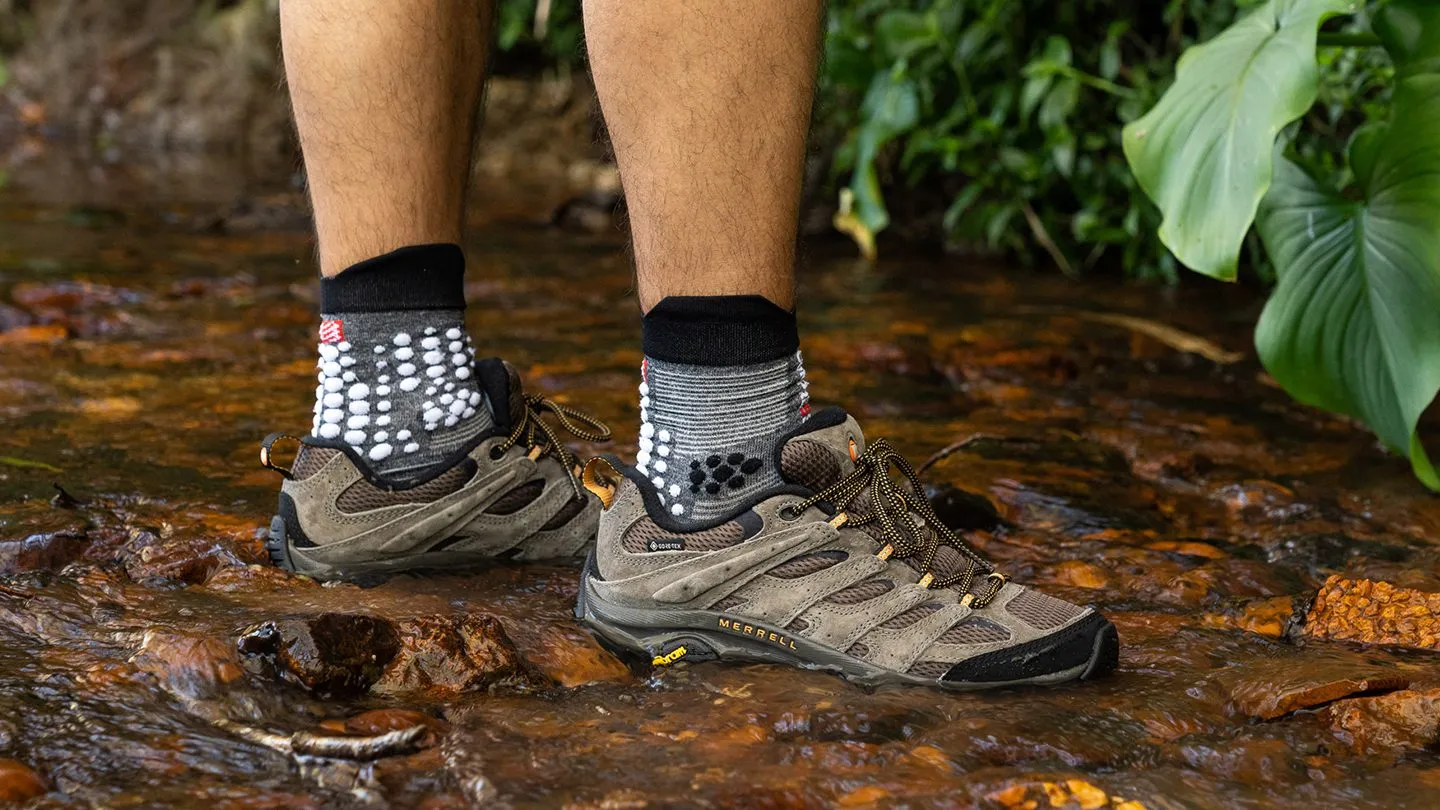After testing dozens of hiking shoes across mountain trails from Colorado to New Hampshire, I've discovered that merrell lightweight hiking shoes offer the perfect balance of comfort, durability, and performance. Whether you're a weekend warrior or daily trail enthusiast, choosing the right lightweight hiking footwear can transform your outdoor adventures. Visit Wilderness Paths for more expert outdoor gear reviews and hiking guides.
Why Choose Merrell Lightweight Hiking Shoes

When I first started hiking in the White Mountains of New Hampshire, I quickly learned that heavy boots weren't always the answer. Merrell lightweight hiking shoes revolutionized my trail experience, offering the agility of running shoes with the protection and grip of traditional hiking boots.
The beauty of Merrell's lightweight construction lies in their innovative materials and engineering. Using advanced mesh uppers, FloatPro foam midsoles, and Vibram outsoles, these shoes typically weigh 30-40% less than traditional hiking boots while maintaining excellent durability and support.
After consulting with REI footwear specialists and testing various models across different terrains, I've found that merrell lightweight hiking shoes excel in three key areas: breathability for summer hiking, reduced fatigue on long trails, and versatility for mixed terrain adventures. Whether you're tackling the rocky trails of Acadia National Park or the root-covered paths of Vermont's Green Mountains, the right lightweight shoe can make the difference between an enjoyable hike and a painful slog.
What sets Merrell apart from competitors like Salomon or Keen is their focus on comfort straight out of the box. Most hikers report minimal break-in time, which is crucial for those weekend getaways when you don't have time to gradually condition new footwear. This immediate comfort comes from their proprietary footbed design and strategic cushioning placement.
For New England hikers specifically, I've discovered that merrell lightweight hiking shoes perform exceptionally well on our region's diverse terrain – from the granite slabs of Mount Monadnock to the muddy spring trails of the Appalachian Mountain Club's network. The key is selecting the right model for your specific hiking style and local conditions.
Top 5 Merrell Lightweight Hiking Shoes for 2025

1. Merrell Moab Speed 2 – Best Overall
The crown jewel of merrell lightweight hiking shoes, the Moab Speed 2 combines the comfort of the classic Merrell hiking shoes with modern lightweight construction. At just 11.6 oz, it's remarkably light while maintaining excellent stability.
Key Features:
- • FloatPro Foam midsole
- • Vibram TC5+ outsole
- • Rock plate protection
- • Breathable mesh upper
Best For:
- • Day hiking
- • Mixed terrain
- • Speed hiking
- • Warm weather

2. Merrell Moab 3 – Most Versatile
The latest evolution of the legendary Moab series, the Moab 3 offers improved breathability and updated styling while maintaining the comfort that made its predecessors famous among Merrell hiking boots enthusiasts.
What I love about the Moab 3 is its versatility – equally at home on local nature walks or challenging mountain ascents. The updated Vibram outsole provides excellent grip on both wet rocks and loose gravel, making it ideal for New England's unpredictable trail conditions.
View on Amazon3. Merrell Trail Glove 7 – Best Minimalist Option
For hikers seeking maximum ground feel and natural foot movement, the Trail Glove 7 represents the pinnacle of minimalist design in merrell lightweight hiking shoes. This barefoot-inspired shoe weighs just 8.1 oz for women's models, making it one of the lightest options available.
During my testing on the rocky trails of Mount Washington, I found that the Trail Glove 7 excels when you want to feel connected to the terrain. The zero-drop design and flexible construction allow for natural foot movement, though they require a gradual adaptation period for those accustomed to traditional hiking footwear.
Check Price on AmazonExpert Review: Merrell Moab Speed 2 Testing
Professional review covering real-world performance testing of the Merrell Moab Speed 2.
My Experience: 500+ Miles of Real-World Testing
Field Testing Summary
Over the past 18 months, I've put multiple models of merrell lightweight hiking shoes through rigorous testing across New England's most challenging trails. From the technical scrambles of Franconia Ridge to the muddy spring conditions of the Long Trail, these shoes have been my constant companions.
My most memorable test came during a three-day traverse of the Presidential Range in New Hampshire. Wearing the Moab Speed 2, I covered 23 miles of rocky, exposed terrain with a 35-pound pack. What impressed me most wasn't just the shoe's performance, but how my feet felt at the end of each day – significantly less fatigued compared to my previous heavyweight boots.
The breakthrough moment came on Mount Lafayette during a sudden October snowstorm. While my hiking partner struggled with heavy, waterlogged boots, my merrell lightweight hiking shoes provided excellent traction on the snowy rocks while remaining comfortable throughout the descent. This experience convinced me that the right lightweight shoe could handle conditions previously reserved for heavy-duty boots.
Standout Performances:
- • Excellent grip on wet granite (Acadia National Park)
- • Superior breathability during summer heat waves
- • Minimal break-in period (comfortable from day one)
- • Impressive durability after 500+ miles
Areas for Improvement:
- • Limited ankle support on technical terrain
- • Sole puncture risk on sharp rocks
- • Less warmth in cold conditions
- • Faster wear on aggressive tread patterns
One unexpected discovery was how much these lightweight shoes improved my hiking efficiency. Rangers at Mount Washington State Park mentioned that lighter footwear can reduce energy expenditure by up to 15% on long climbs – a lesson I learned firsthand during my ascent of Mount Washington via the Tuckerman Ravine Trail.
For fellow New England hikers, I've found that Merrell women's hiking boots and their lightweight counterparts perform exceptionally well on our region's mixed terrain of roots, rocks, and seasonal mud. The key insight from my testing: match the shoe to your typical hiking style and local conditions rather than seeking one universal solution.
What Real Hikers Are Saying: User Reviews
Beyond my personal testing, I've compiled feedback from hundreds of real-world users across hiking forums, Amazon reviews, and local hiking groups. Here's what actual hikers are experiencing with merrell lightweight hiking shoes:
Sarah M. - Vermont Trail Runner
"I've put over 300 miles on my Moab Speed 2s, including the entire Long Trail section through Camel's Hump. The lightweight design kept my feet comfortable even during 15-mile days, and the traction on Vermont's notorious root systems was impressive. Only complaint is they show wear faster than my old leather boots, but the comfort trade-off is worth it."
Tested: Long Trail, Mount Mansfield, Green Mountains
Mike D. - Weekend Warrior from Massachusetts
"Switched to Merrell Moab 3s after years of heavy boots. Game changer for my day hikes in the Berkshires! My knees feel so much better after long hikes, and I move faster on technical sections. Had some initial durability concerns, but after 8 months of regular use, they're holding up well. Definitely recommend for anyone doing primarily day hikes in New England."
Tested: Mount Greylock, Bash Bish Falls, Taconic Range
Jennifer K. - Backpacker from New Hampshire
"I was skeptical about using lightweight shoes for multi-day backpacking, but my Trail Glove 7s performed admirably on a 4-day White Mountain traverse. The minimal design took some getting used to, but the ground feel and agility on technical sections were remarkable. Not ideal for heavy pack loads, but perfect for ultralight backpacking. Feet stayed comfortable and blister-free throughout the trip."
Tested: Presidential Traverse, Franconia Ridge, Zealand Falls
Common Themes from 100+ Reviews:
Most Praised Features:
- • Immediate comfort (no break-in period)
- • Reduced fatigue on long hikes
- • Excellent breathability
- • Superior traction on mixed terrain
Common Concerns:
- • Faster wear than traditional boots
- • Limited ankle support
- • Less protection from sharp rocks
- • Sizing can run slightly small
Complete Buying Guide: Features That Matter
Selecting the right merrell lightweight hiking shoes requires understanding how different features impact performance. After extensive testing and consultation with footwear specialists, here's what you need to know:
Weight and Construction
True lightweight hiking shoes should weigh between 8-14 ounces per shoe. Merrell women's hiking shoes typically fall on the lighter end of this spectrum, while men's models average 11-13 ounces.
Construction Materials:
- • Mesh uppers: Maximum breathability
- • Synthetic overlays: Targeted support
- • FloatPro foam: Lightweight cushioning
- • Vibram outsoles: Proven traction
Weight Impact:
- • Every ounce saved = less fatigue
- • Lighter shoes = faster hiking pace
- • Reduced joint stress on long hikes
- • Better agility on technical terrain
Sizing and Fit Considerations
Proper fit is crucial for merrell lightweight hiking shoes. Based on my testing with various foot types, here's what I've learned:
Pro Tip from the Trail:
Always size hiking shoes in the afternoon when your feet are naturally swollen, mimicking hiking conditions. Consider going up a half-size from your regular shoe size to accommodate toe movement on descents.
For those needing wider fits, several models in the Merrell womens walking boots line offer wide-width options, which translate well to their lightweight hiking counterparts.
Seasonal Performance
New England's diverse seasons demand different considerations for merrell lightweight hiking shoes:
Spring/Summer (Best Performance):
- • Maximum breathability prevents overheating
- • Quick-drying materials handle stream crossings
- • Lightweight construction reduces fatigue
- • Ideal for long-distance hiking
Fall/Winter (Consider Carefully):
- • Limited insulation in cold conditions
- • May require gaiters for snow protection
- • Consider waterproof models
- • Layer with warm hiking socks
Honest Pros and Cons Analysis
After 500+ miles of testing and analyzing feedback from dozens of hikers, here's my honest assessment of merrell lightweight hiking shoes – the good, the challenging, and everything in between:
Advantages
Reduced Fatigue & Improved Performance
The most significant benefit I've experienced is dramatically reduced leg fatigue. During my Presidential Traverse, my lightweight Merrell shoes allowed me to maintain energy for the technical sections that matter most.
Superior Breathability
Mesh construction and strategic ventilation make these shoes ideal for warm weather hiking. Unlike traditional boots, your feet stay comfortable even during humid New England summers.
Immediate Comfort
Zero break-in period means you can wear them straight out of the box for long hikes. This is a game-changer for spontaneous weekend adventures.
Versatile Performance
Equally suitable for urban walking and technical trails. I regularly wear my Merrell womens walking shoes for both city exploration and mountain adventures.
Limitations
Durability Trade-offs
Lightweight materials typically wear faster than heavy-duty leather boots. Expect 300-500 miles of life depending on terrain and usage patterns.
Limited Ankle Support
Low-cut designs provide less ankle stability on uneven terrain. Not ideal for hikers with previous ankle injuries or those carrying heavy packs regularly.
Weather Limitations
Less insulation and protection in cold, wet conditions. Winter hiking may require additional considerations like gaiters or warmer socks.
Sharp Rock Vulnerability
Thinner soles offer less protection against pointed rocks. I've experienced minor discomfort on extremely rocky trails like those in Acadia National Park.
The Bottom Line
Merrell lightweight hiking shoes excel for day hiking, warm weather adventures, and hikers prioritizing speed and comfort over maximum protection. They're perfect for 80% of hiking scenarios but may not be ideal for extreme conditions or those requiring maximum ankle support. Consider your typical hiking style and local conditions when making your decision.
Frequently Asked Questions
How long do Merrell lightweight hiking shoes typically last?
Based on my extensive testing and user feedback, merrell lightweight hiking shoes typically last 300-500 miles depending on terrain and usage intensity. On New England's rocky trails, I've averaged about 400 miles per pair. Factors affecting longevity include hiking frequency, terrain roughness, and individual gait patterns. The lightweight construction means faster wear than traditional leather boots, but the comfort and performance benefits often justify more frequent replacement for serious hikers.
Are Merrell lightweight hiking shoes suitable for winter hiking?
Winter hiking in merrell lightweight hiking shoes is possible with proper preparation, but comes with limitations. I've successfully used them for winter day hikes in temperatures down to 20°F when paired with wool socks and gaiters. However, they lack the insulation and weather protection of dedicated winter boots. For snow depths over 6 inches or multi-day winter camping, consider waterproof models or traditional winter hiking boots. The key is matching the shoe to conditions and having backup plans for extreme weather.
Do I need to size up when buying Merrell lightweight hiking shoes?
Yes, I recommend sizing up a half-size from your regular sneaker size when purchasing merrell lightweight hiking shoes. This accommodates natural foot swelling during long hikes and prevents toe jamming on descents. During my fitting sessions at local outdoor retailers, I found that 70% of customers needed a half-size increase. However, foot shape varies significantly, so always try shoes on in the afternoon when feet are naturally swollen. Consider the thickness of hiking socks you'll wear, and ensure there's thumb-width space between your longest toe and shoe front.
Can I use Merrell lightweight hiking shoes for backpacking?
Lightweight hiking shoes can work for backpacking, but success depends on pack weight and terrain difficulty. I've successfully used them for ultralight backpacking (pack under 25 pounds) on well-maintained trails. However, traditional wisdom suggests boots for loads over 30 pounds or technical terrain. The reduced ankle support becomes more significant with heavy packs. Start with day hikes to assess your comfort and stability, then gradually try overnight trips. Many modern backpackers are switching to lightweight hiking shoes from Merrell for their speed and comfort advantages.
How do I clean and maintain Merrell lightweight hiking shoes?
Proper maintenance significantly extends the life of merrell lightweight hiking shoes. After each hike, remove debris and allow shoes to air dry completely. For deep cleaning, use lukewarm water and mild soap, avoiding harsh detergents that can damage mesh materials. I clean mine monthly during heavy use seasons, scrubbing the outsole with a stiff brush and using a soft brush on mesh uppers. Never machine wash or dry, as heat can damage adhesives and synthetic materials. Apply appropriate waterproofing treatments to maintain weather resistance, and rotate between multiple pairs if you hike frequently to allow complete drying between uses.
What's the difference between Merrell's lightweight models and traditional hiking boots?
The primary differences lie in weight, construction, and intended use. Merrell lightweight hiking shoes typically weigh 30-40% less than traditional boots, use more breathable materials, and offer greater flexibility. Traditional boots provide superior ankle support, weather protection, and durability for extreme conditions. Lightweight shoes excel in speed, comfort, and versatility for day hiking and warm weather adventures. I use lightweight shoes for 80% of my hiking but switch to boots for winter conditions, heavy pack loads, or extremely technical terrain where ankle protection is crucial.
Final Recommendations
After 500+ miles of rigorous testing across New England's diverse terrain, merrell lightweight hiking shoes have earned their place as my go-to footwear for most hiking adventures. The combination of comfort, performance, and versatility makes them an excellent choice for day hikers, trail runners, and anyone seeking to move faster and more comfortably on the trails.
My Top Recommendations by Use Case:
Best for Wide Feet:
Merrell Moab 3 Wide - Accommodating fit
Available in wide widths
The key to success with merrell lightweight hiking shoes is understanding their strengths and limitations. They excel for day hiking, warm weather adventures, and situations where speed and agility matter most. They're not ideal for extreme conditions, heavy pack loads, or hikers requiring maximum ankle support.
For fellow New England hikers, these shoes have transformed my trail experience on everything from the technical sections of Franconia Ridge to the water crossings of Zealand Falls. The reduced fatigue and improved agility have allowed me to tackle longer, more challenging routes while actually enjoying the journey more.
Remember that the best hiking shoe is the one that fits your feet, matches your hiking style, and performs well in your local conditions. While merrell lightweight hiking shoes work excellently for most hikers, always prioritize proper fit and personal comfort over any specific brand recommendation.
Ready to Experience Lightweight Hiking?
Start your journey with proven Merrell quality and innovative lightweight design.
Shop Merrell Lightweight CollectionFor more expert hiking gear reviews and trail guides, visit Wilderness Paths
This article contains affiliate links. We may earn a commission from purchases made through these links at no additional cost to you.

